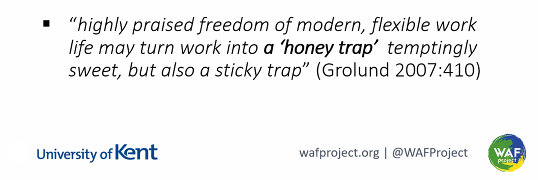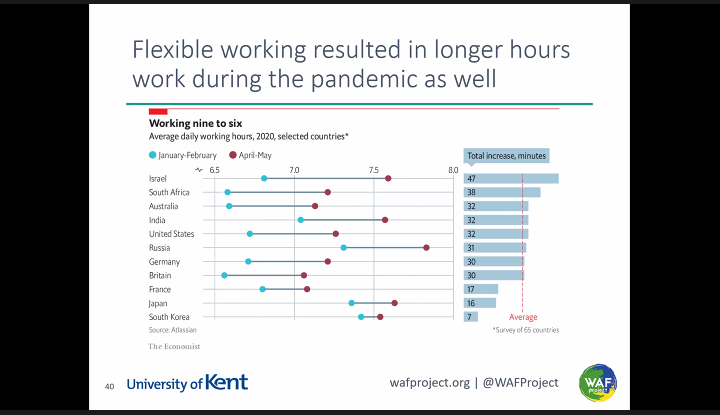
Looking forward to what should be an interesting conversation about the impact #Coronavirus has had on flexible working & the role of social policy in ensuring that we achieve better work-life balance for employees #FlexibilityParadox
https://twitter.com/DSPI_Oxford/status/1496149796196868098
First, Prof @HeejungChung discusses her inspiration behind the @WAFProject was from her own experience of the "myth of the academic summer" where the 3 month "break" is mostly spent working even when on holiday (eg reading academic 📚s instead of for pleasure) #FlexibilityParadox
This, Chung argues, is an example of the "flexibility paradox", where those who have the most power to end up deciding how & when they work end up working the longest hours #FlexibilityParadox 

First, Chung looks at the availability of flexible work across 🇪🇺. Focusing on 🇬🇧, Chung says that flexible work tends to be more intense due to "intensification through the back door", social pressures & lack of distractions #FlexibilityParadox 



This, Chung argues, began with the rollouts of 📱 amongst professionals. This "always available, always on" mentality meant that people felt social and self pressures to maintain a professional reputation by working longer hours - leading to "self-explotation" #FlexibilityParadox
Chung says this self-exploitation stems from workers wanting to give themselves a competitive edge - with workers becoming so-called "arbeitskraftunternehmer" ("entreployee") - becoming more entrepreneur-like in their work ethic, rather an as mere employees #FlexibilityParadox
At the same time, Chung says we are witnessing the demise of collective bargaining and seeing the welfare state decimated by austerity. #FlexibilityParadox
This, Chung says, has led to the individualisation of risks - with each worker viewing themselves as being the ones responsible for freedom over their work & ∴ one works harder to make oneself seem more competitive & marketable #FlexibilityParadox
Chung says this has led to "Internalised Capitalism", where one's self-worth is defined largely on doing well in one's career, and busyness is worn as a "badge of honour" as it is seen as people contributing to society #FlexibilityParadox 

As a result of this, Chung says we are increasingly seeing "Passion Exploitation", with people expected to find work rewarding & being a defining part of oneself, as well as simply being a way of earning a paycheck #FlexibilityParadox 

Chung argues that this idea of "doing what you love" leaves people open to exploitation - with Chung highlighting "creatives working for exposure" as a particular example #FlexibilityParadox
Chung also says there is a gendered element to flexible working schedules - with🚹 more likely to increase their overtime compared to 🚺 #FlexibilityParadox 



Chung also notes there is a difference between manual and office-based work. Manual workers, who are often more likely to be paid by-hour, tend not to do more overtime, but will earn more money by sacrificing break times instead #FlexibilityParadox
Going back to the gender divide, Chung says we are, to an extent, looking at the wrong data. Women may be less likely to undertake more hours at work, we are seeing a rise in "intensive parenting", with women investing more time in their children #FlexibilityParadox
As a result, Chung argues that flexible working is in fact seeing the "traditionalisation of gender roles", with 🚺 becoming increasingly more likely to take on household chores when working flexibly & 🚹 more likely to take on more hours #FexibilityParadox
Chung notes that this has led to the exploitation of women in the labour market. Without changing the normative views of work or gender roles, 🚺 are more likely to increase the amount of labour they provide for free, often sacrificing personal leisure time #FlexibleWorking
Chung also notes that there is a "flexibility stigma" - with flexible workers not seen as "loyal workers". Cites the current post-#Coronavirus discourse around "returning to the office" as an example #FlexibilityParadox 

Chung notes that 🚹 are more likely to feel stigmatised by working flexibly as it challenges concepts of masculinity. However, it is 🚺, #BAME individuals, #Disabled workers & #LGBT workers who will experience in-work penalties for requesting flexible working #FlexibilityParadox
Chung argues attitudes to flexiworking reflects wider cultural attitudes. Compares 🇬🇧 to 🇳🇱, who would finish work at 4 as it was culturally acceptable to engage in sport or have family dinner at that time #FlexibilityParadox
Chung also argues that wider debates around "who cares" - both in terms of welfare and gender norms - will have an impact on attitudes to flexi-working. Egalitarian societies will not see such differences in attitudes to 🚹 & 🚺 workers #FlexibilityParadox
This changed during #Coronavirus - when flexible working became a "government mandate" rather than an "employer gift". As a result, we saw reductions in stigmas towards flexi-working #FlexibilityParadox 

However, the pandemic was not the "great equaliser" many said it would be, with Chung noting that people worked longer hours & although 🚹 undertook more household chores, 🚺 saw an even greater increase in the amount they did too #FlexibilityParadox 



Chung concludes by saying that we need reformed labour laws which would allow:
- Normalising flexible working
- A "right to disconnect"
- Enabling 🚹to be more involved in childcare
- A national strategy for shorter working
#FlexibilityParadox
- Normalising flexible working
- A "right to disconnect"
- Enabling 🚹to be more involved in childcare
- A national strategy for shorter working
#FlexibilityParadox
In closing, Chung recognises that flexible working is "not a panacea, rather an amplifier". While it can open up new opportunities for work, prevailing attitudes may also lead to the exacerbation of inequalities from those furthest from the labour market #FlexibilityParadox
Really interesting presentation on the challenges & opportunities flexible working brings & what policies can best help more people enjoy the benefits. Thanks to @HeejungChung for your insights, to @CicciaRossella for chairing & to @DSPI_Oxford for hosting! #FlexibilityParadox
• • •
Missing some Tweet in this thread? You can try to
force a refresh



